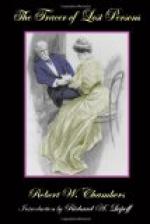CHAPTER XX
For a full minute the two men sat there without moving or speaking. Then the Tracer laid aside his pencil.
“To sum up,” he said, opening the palm of his left hand and placing the forefinger of his right across it, “the excavation made by the falling pillar raised in triumph above the water garden of the deposed king, Meris, by his rival, was the subterranean house of Meris. The prostrate figure which crumbled to powder at your touch may have been the very priest to whom this letter or papyrus was written. Perhaps the bearer of the scroll was a traitor and stabbed the priest as he was reading the missive. Who can tell how that priest died? He either died or betrayed his trust, for he never aroused the little Samaris from her suspended animation. And the water garden fell into ruins and she slept; and the Ruler of Upper and Lower Egypt raised his columns, lotus crowned, above the ruins; and she slept on. Then—you came.”
Burke stared like one stupefied.
“I do not know,” said the Tracer gravely, “what balm there may be in a suspension of sensation, perhaps of vitality, to protect the human body from corruption after death. I do not know how soon suspended animation or the state of hypnotic coma, undisturbed, changes into death—whether it comes gradually, imperceptibly freeing the soul; whether the soul hides there, asleep, until suddenly the flame of vitality is extinguished. I do not know how long she lay there with life in her.”
He leaned back and touched an electric bell, then, turning to Burke:
“Speaking of pistol range,” he said, “unstrap those weapons and pass them over, if you please.”
And the young man obeyed as in a trance.
“Thank you. There are four men coming into this room. You will keep your seat, if you please, Mr. Burke.”
After a moment the door opened noiselessly. Two men handcuffed together entered the room; two men, hands in their pockets, sauntered carelessly behind the prisoners and leaned back against the closed door.
“That short, red-haired, lame man with the cast in his eye—do you recognize him?” asked the Tracer quietly.
Burke, grasping the arms of his chair, had started to rise, fury fairly blazing from his eyes; but, at the sound of the Tracer’s calm, even voice, he sank back into his chair.
“That is Joram Smiles? You recognize him?” continued Mr. Keen.
Burke nodded.
“Exactly—alias Limpy, alias Red Jo, alias Big Stick Joram, alias Pinky; swindler, international confidence man, fence, burglar, gambler; convicted in 1887, and sent to Sing Sing for forgery; convicted in 1898, and sent to Auburn for swindling; arrested by my men on board the S. S. Scythian Queen, at the cabled request of John T. Burke, Esquire, and held to explain the nature of his luggage, which consisted of the contents of an Egyptian vault or underground ruin, declared at the customhouse as a mummy, and passed as such.”




